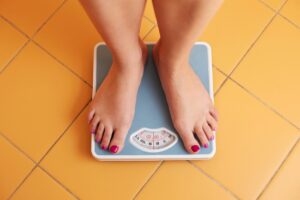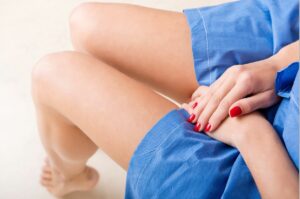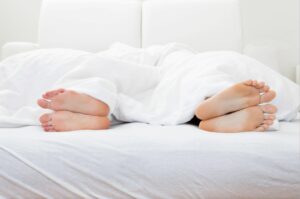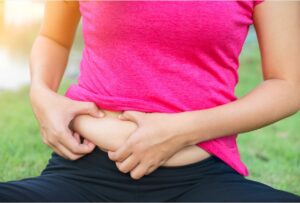
We all know about the dreaded menopause symptoms. But how bad are they really? Healthista spoke to the experts to try and debunk common menopause myths
As if us women don’t already have enough to deal with, the menopause sadly cannot be avoided and is a natural part of ageing, supposedly occurring between the ages of 45 and 55.
In the UK, the average age for a woman to reach the menopause is 51 according to the NHS.
All women are born with a specific number of eggs, which over time reduce as we ovulate, usually every month.
It is when we have lost most of our eggs and are left with around 1,000 that women will start to feel menopausal. So basically, the menopause can be described as when our ovaries start to fail in releasing eggs.
Most women will experience symptoms of menopause for up to five years before they have their last period
This failure causes our oestrogen levels to fall, which tells our brain to send more signals to our ovaries to try and get them to release an egg. This is what leads to the dreaded and infamous symptoms of the menopause.
Most women will experience menopause symptoms for up to five years before they have their last period. However, around one in every ten women experience symptoms for up to ten years.
For reasons that are still unknown, some women sail problem free through the menopause whilst others suffer from symptoms that can significantly interfere with their quality of their life and their ability to function on a day-to-day basis.
However, there are still many myths out there that make the thought of menopause far scarier than it needs to be.
Healthista caught up with the experts to try and debunk some of the common myths surrounding the dreaded menopause symptoms…
Myth #1 You’ll gain weight
‘The menopause isn’t fattening,’ stresses Dr Sarah Brewer, GP.
‘However, over the age of 40, your metabolism slows down and your body needs 250 fewer calories per day than when you were in your twenties’.
Eating less and doing more will reduce the risk of gaining weight in your forties and beyond but you should also ensure your diet features an abundance of fruit and vegetables, beans, nuts and seeds.
‘These contain antioxidants that can stimulate metabolism, boosting fat burning, encouraging weight loss and increasing energy levels,’ adds Dr Brewer.
READ MORE: My post-menopause glow up made me look 10 years younger and gave me my confidence back

Myth #2 You’ll leak
‘Around one in three women experiences continence issues,’ says Valentina Roffi, Clinical Specialist Physiotherapist (pelvic health) and Director at Sprint Physiotherapy.
‘In the lead up to the menopause, oestrogen production reduces and then stops. As a result, the vaginal tissues lose elasticity and the lining of the urethra becomes thinner which, along with weaker pelvic floor muscles, contributes to leaking’.
Valentina stresses that it’s important to consult a specialist doctor in urogynaecology about menopausal continence issues.
Anyone can work on strengthening their pelvic floor
‘They can suggest ways to manage symptoms, perhaps with medications or creams,’ continues Valentina, who also recommends consulting a pelvic health physiotherapist.
‘Pelvic health physiotherapists specialise in the management of urinary problems with effective and sometimes very simple solutions such as bladder training, reviewing fluid intake and strengthening pelvic floor muscles.
‘Anyone can work on strengthening their pelvic floor. Simply focus on tightening the muscles around the front and back passage – if anything else is twitching, you may not be squeezing the right muscle group!’
Myth #3 Everything dries up
As oestrogen levels fall, many parts of the body become drier – hair, skin, nails, eyes and vagina.
Many women find that Hormone Replacement Therapy (HRT) brings relief from menopause symptoms, including dryness.
However, if you’re unable or unwilling to take prescribed oestrogens, soy isoflavones such as Healthspan’s Menoserene, can help.
In addition, oestrogen-containing vaginal treatments which reduce dryness are available on prescription – ask your GP, menopause nurse or a BMS-accredited menopause specialist for more information
also a range of new non-surgical medical procedures that can help with dryness
Many women find that intimate lubricants help relieve vaginal dryness, making sex pleasurable again.
You could also try sea buckthorn oil, a herbal remedy which has been used for centuries to relieve intimate dryness (Healthspan Omega 7 Sea Buckthorn Oil).
‘There are so many new advances available to women, as well as hormonal treatments and specially formulated supplement ranges,’ adds Miss Tania Adib, consultant gynaecologist at The Medical Chambers Kensington.
‘There’s also a range of new non-surgical medical procedures that can help with dryness that have had very positive results.
‘The MonaLisa Touch, plus other new las treatments to deal with vaginal atrophy, incontinence and painful conditions, such as vulvodynia that many women may experience during menopause but it is vital to understand there are new medical treatments that can help’.
READ MORE: ‘Menopause symptoms ruined my sex life but this device helped me get it back’

Myth #4 Everyone gets hot flushes
Recent research found that hot flushes and their bedtime companion, night sweats, affect 84 per cent of peri-menopausal and menopausal women.
However, a clinical trial published in the scientific journal Heliyon earlier this year confirmed the age-old belief that sage can help relieve hot flushes and night sweats.
‘Women who received a daily dose of A. Vogel Menoforce® Sage, which contains freshly harvested sage, found that their hot flushes decreased in quantity as well as intensity,’ explains Alison Cullen, A. Vogel nutritional practitioner and education manager.
sage can help relieve hot flushes and night sweats
‘After four weeks, 60 per cent of participants had at least a 50 per cent reduction in hot flushes, while after eight weeks, they had decreased by 64 per cent and were still on the decrease.
‘In addition, overall, the women in this trial who were treated with Menoforce® were in a more relaxed and focused state of mind’.
READ MORE: From hot flushes to vaginal dryness – 6 top tips to ease menopause symptoms

Myth #5 You can’t get pregnant when taking HRT
‘Although, overall, the chance of conception in your late forties and early fifties when on HRT is very slim, HRT isn’t a form of contraception,’ stresses consultant gynaecologist Dr Anne Henderson, author of The Natural Menopause.
‘To prevent pregnancy, it’s always advisable to also use a non-hormonal, barrier contraception such as condoms or alternatively the Mirena Coil. This is a flexible method of contraception that can also provide a form of HRT and I frequently recommend to women who are peri-menopausal.
HRT isn’t a form of contraception
‘Equally, if someone is experiencing menopause symptoms, they should not take HRT if they’re trying to get pregnant. HRT is for women who have completed their family’.
Myth #6 Your sex life is over
‘There’s no reason why intimacy should stop,’ says Dr Brewer.
‘In fact, some menopausal women feel more passionate as lower oestrogen levels means the small amount of testosterone in their bodies has a stronger effect. There’s also less worry about pregnancy, which can have a liberating effect’.
However, common menopause symptoms such as fatigue, anxiety, mood swings and vaginal dryness can all take their toll on your sex drive.
‘If low libido is causing problems within your relationship, talk to your doctor,’ suggests Dr Brewer.
READ MORE: Menopause symptoms making you miserable? These natural fixes will help

Myth #7 You can’t take HRT if you’ve had cancer
‘This isn’t true,’ stresses Dr Anne Henderson, Consultant Gynaecologist, BMS-accredited Menopause Specialist and Director of The Amara Clinic.
‘There are different forms of HRT and different considerations to take into account, depending on age and type of cancer.
risks from HRT are higher if you’re overweight and drink
‘For example, risks from HRT are higher if you’re overweight and drink and data is showing this is linked to even moderate drinking (so two units a day, 14 units a week) increases the risk significantly of breast cancer – more than the actual risk of HRT.
‘If you have any concerns over a possible cancer risk, ideally ask your GP to refer you to talk to a Menopause Specialist who is accredited by the British Menopause Society‘.
Myth #8 ‘Meno-middle’ will replace your waist
Although weight gain isn’t inevitable in the lead up to the menopause, or afterwards, any extra pounds tend to make a beeline for the midriff!
‘Researchers from Ohio University have identified an enzyme which increases levels of fat production and ‘thickening’ around the middle,’ reveals Dr Sarah Brewer.
‘Oestrogen supresses this enzyme but as the levels of this hormone fall due to the menopause, the effects of this enzyme increase’.
To combat this, DR Brewer advises eating a healthy, balanced diet, reducing portion sizes and cutting out unhealthy snacks and drinks.
Exercise will also help to keep meno-middle at bay – combine regular cardio workouts with Pilates or yoga, which are both excellent for toning abdominal muscles.
READ MORE: Are you a pear, apple or hourglass? These are the best diet and exercise choices for your body type

#9 Your anxiety levels will soar
Dr Meg Arroll a Chartered Psychologist and co author of new book by Mariella Frostrup Cracking the Menopause: While Keeping Yourself Together says, ‘Anxiety is often cited as a symptom of the menopause, with about a quarter of women saying they feel anxious during this time.
HRT and anti-depressants can help to alleviate menopause-related anxiety
‘However, anxiety is also common in the general population – a recent study found that 65 per cent of us believe life is becoming increasingly more anxiety-provoking.
‘HRT and anti-depressants can help to alleviate menopause-related anxiety during the peri-menopause but you may want to try evidence-based therapies for anxiety such as yoga, reflexology, massage and, very importantly, taking time out for self-care and pampering’.
#10 The menopause is a nightmare
Not necessarily so!
‘By looking after yourself before and after the menopause, taking a good quality multivitamin that has all you need and is formulated for women in fifties is a good option so you can help ensure this time of life is rich and enjoyable,’ says Dr Sarah Brewer.
In addition, Priestess of the Goddess, Charlotte Haigh, encourages women to reclaim as a time to step into our power.
‘A new attitude to this stage of life can help us embrace it and feel positive about it,’ says Charlotte.
‘We need to see ourselves as experienced, wise women with much to offer our communities.
‘And with modern life spans, we could have decades left to do whatever we want. How do you want the rest of your life to be? Dream big!’
Like this article? Sign up to our newsletter to get more articles like this delivered straight to your inbox.
Discover more from reviewer4you.com
Subscribe to get the latest posts to your email.



